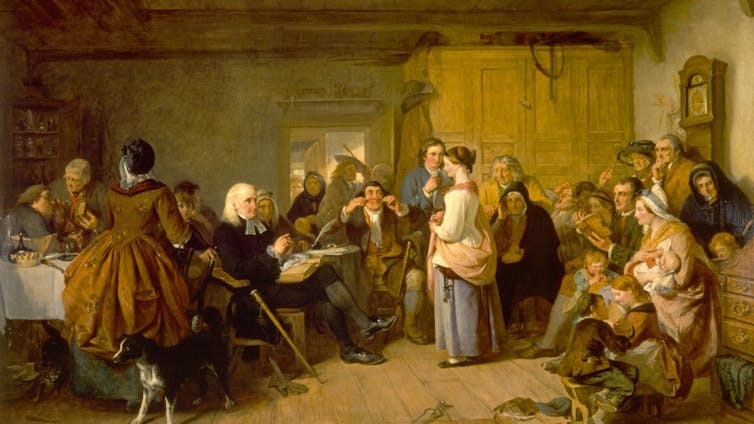In the 18th and 19th centuries, Presbyterians from Ulster in Northern Ireland had a somewhat surprising reputation for being especially – if not excessively – concerned with sex.
As the Ordnance Survey Memoirs Observer for the parish of Rashee in County Antrim candidly put it in 1835, while the Presbyterians of the north of Ireland “unhesitatingly” claimed for themselves a general character of “extreme morality”, they were “not the pious race so generally imagined”.
The records of the Presbyterian church in this period certainly give the impression of a community with a vibrant sexual culture – though one that was also strictly policed. It is this tension between piety and promiscuity that I explore in my new book, Pious and Promiscuous: Life, Love and Family in Presbyterian Ulster – revealing for the first time personal stories that shaped the rhythms and rituals of Presbyterian family life in 18th- and 19th-century Ulster.
The Presbyterian church closely regulated the intimate lives of its members through a system of church court discipline. Misbehaving members could find themselves before the Kirk Session (the church’s local court) for a wide range of offences including bigamy, drunkenness, slander, fist fights and skipping Sabbath services. But it was sexual misbehaviour that sent most to these courts.
Of the 375 cases considered by First Dromara Kirk Session in County Down between 1780 and 1805, 230 concerned sexual misbehaviour. Similarly, more than half of all cases heard by Carnmoney Kirk Session in County Antrim between 1786 and 1821 were of a sexual nature.
Sexual offences was a broad category that included sex between unmarried and about-to-be-married persons (known as fornication or pre-marital fornication), sex with someone who was not your spouse (adultery), and “scandalous carriage” – intimate acts that stopped short of full sexual intercourse, such as kissing or heavy petting.
Conduct which raised suspicions that sex had taken place also fell under this heading. Couples who spent time together alone and unchaperoned could be cited, as well as those who were caught in compromising situations.

This is what happened to John Woodend, a married man and member of the Aghadowey Presbyterian congregation in County Londonderry. His bedsharing practices roused suspicions that he had been guilty of adultery. In October 1704, Woodend was told off by the Kirk Session after he was seen lying “in naked bed” with his servant maid, Margaret.
A man named John Boil reported seeing the pair in bed together, then watching as Woodend got up and began “pulling on his cloths”. Since Woodend’s wife was also in the room at the time – she was sitting on a chair next to the bed – the session ruled it was unlikely the bedsharing pair had committed adultery. But Woodend’s conduct was still considered “unseemly and offensive”, resulting in his censure for “unseemly carriage”.
Sex first, marriage second?
The sheer volume of sexual misbehaviour cases heard by the church courts appears to suggest that Presbyterians were relatively permissive in their attitudes to sex outside marriage.
Fornication and pre-marital fornication were, after all, the most numerous sexual offences. Indeed, historians used to believe that Presbyterians were different from other religious communities in Ireland because of their perceived tolerance of extra-marital sex. But that impression is misleading.
Records of the church courts show that Ulster Presbyterians were far from “promiscuous” in their attitude to sexual morality. Kirk Session minute books reveal how Presbyterian women and men engaged in sexual intercourse as part of the rituals of courtship and marriage.
In Ulster, many Presbyterian couples entered a form of marriage known as verba de futuro – a promise to marry in the future that was then sealed with sexual intercourse.
This is how the marriage of Benjamin Green and Elizabeth Bell, members of Cahans Presbyterian church in County Monaghan, came about. In March 1753, the couple told Cahans Kirk Session they had sworn secretly to each other that they would marry “some [time] before actual marriage” – and then confirmed their promises to marry in the future by having sex.
More than 20 years later, Margaret Cunningham shared a similar story about her marriage to Robert Jackson. According to Cunningham, she and Jackson exchanged marriage vows on the “last Friday of March”, then “bedded” together “the following Monday”. Like many other Presbyterians, these couples may not have considered their sexual behaviour as sinful because they had every intention of progressing to marriage.
The stories contained in the Presbyterian archive – a term I use to describe records produced by and about members of Ulster’s Presbyterian community – provide a tantalising glimpse into the intimate worlds of women and men in Ulster, centuries ago.
Their stories remind us how individual experiences could both conform to, and deviate from, societal expectations. Presbyterians did indeed have colourful sex lives – just as they also valued marriage.
Looking for something good? Cut through the noise with a carefully curated selection of the latest releases, live events and exhibitions, straight to your inbox every fortnight, on Fridays. Sign up here.
Research for my book has received funding from: Arts and Humanities Research Council Postgraduate funding, the R.J. Hunter Bursary from the Royal Irish Academy, the Anna-Parnell Travel Grant from the Women's History Association of Ireland and internal funding from the University of Hertfordshire.
This article was originally published on The Conversation. Read the original article.







